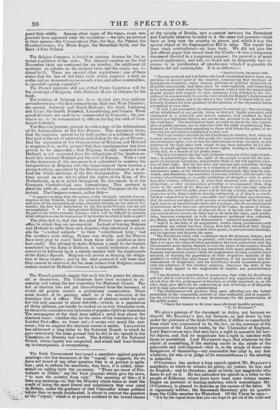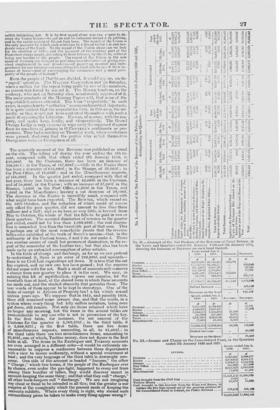The Irish Government has issued a manifesto against popular meetings—for
the discussion of the "repeal," we suppose, for we 'barve not heard of any other question that is at present in agitation; and, to enforce the manifesto, they have, it is added, determined on calling forth the yeomanry. "There are enow of Protestants in Ulster," say the Irish journals which give the news, "-to save the country from ruin." The meaning of this—if it hate any meaning—is, that the Ministry which takes to itself the credit of being the most liberal and conciliatory that ever ruled in Itritain, under the guidance of that Chancellor whose political =lidvice they so much desiderated, is about to convert the question 'fif the "repeal," which is at present confined to the lowest classes
of the vicinity of Dublin, into a contest between the Protestant and Catholic interests to enlist in it the same bad passions which have so long torn the country, in pieces, and which it was the special object of the Emancipation Bill to allay. The report has been since contradicted—we hope truly. We did not give the last official paper that issued from the Castle—it was a temporary document directed to a temporary purpose : the present is of more general application, and will, we doubt not, be frequently had recourse to in justification of interference which it is possible its framers did not contemplate. It is as follows :—
" Dublin Castle, December 1830.
" Having received and laid before the Lord-Lieutenant letters from magistrates in several parts of the country, announcing that meetings of mischievous tendency, under 'various pretexts of political discussion or of public amusement, had taken place or were expected, and requesting to be informed what course the Government wished that the magistrates should pursue with respect to such meetings' I am directed by his Excellency to communicate to you the view which his Majesty's Government take of this question, and to lay down a line which it is hoped will be sufficiently distinct for your guidance in the exercise of the important duties committed to your care. " It will, I am persuaded, be unnecessary to remind you, that meetings of the inhabitants of any parish, town, or district, legally convened, and conducted in a peaceable and orderly manner, and coufined to their avowed and legitimate objects, are not on any account to be molested by the civil force. The Government have no wish to check the fair expression of public opinion, nor to interfere with the right of petitioning Parliament, or of temperately appealing to those with whom the power of redressing the grievances complained of may rest. " But I am further directed by his Excellency to observe, that, while he is most anxious to secure to the people the undisturbed exercise of their constitutional rights, it is no less his determination than his duty, in the exercise of the high office with which he has been intrusted by his Majesty, to guard against any abuse of those rights, leading to the violation of the law, or a breach of tile public peace.
"The law recognizes the fair and legitimate exercise of the right of petition; it acknowledges also the right of the people to meet for the purposes of innocent recreation, and protects them in the full and free exercise of that right. But the law does not warrant any assemblies having a manifest and direct tendency to a violation of the public peace, under whatsoever name, or for whatsoever professed purpose, they may be convened; and therefore, any assemblies of persons, whether collected under the pretence of petitioning, or of public exhibitions of strength or skill, or under any other pretence whatsoever,if, front their numbers, acts, place or times of meeting, or other circumstances preceding or accompanying them, they excite in the minds of his Majesty's welldisposed and peaceable subjects reasonable fear that the public peace will be thereby violated, and the lives or properties of the King's subjects thereby endangered, or if they be so constituted or conducted as to induce reasonable and well-founded apprehensions, that the motives and objects of the persons so assembling are not the fair and legal exercise of constitutional rights and privileges, but the accomplishment of alterations in the laws and constitution of the realm, by means of intimidation, and by demonstration of physical force, or by any other than legal and constitutional means—in these and in all such like cases, such assemblies, however composed, or with whatsoever professed view collected, are illegal, and are by the law denominated unlawful assemblies.'
"And it is the duty of all magistrates, within whose jurisdiction such assemblies are called together (being first duly satisfied of their illegal nature), by all lawful means within their power, to prevent such meetings, and to suppress and disperse the same.
"His Excellency relies with confidence upon the firmness, temper, and discretion of the magiFtracy in general ; and I am directed to remind you that it is upon the union of these qualities in the local authorities that the Government must mainly depend, in case the peace of the country should be threatened. His Excellency has remarked, with much satisfaction, the humane and prudent course which the magistrates of some counties have adopted, of warning the population of their respective districts of the penalties to which they may expose themselves, if led unwarily into the commission of illegal acts ; and his Excellency would recommend generally the adoption of this salutary measure, wherever the state of the country may appear to the magistrates to require any precautionary steps.
" I am directed, in conclusion, to assure you, that while his Excellency will not fail to visit with his severest displeasure any magistrates who may shrink from the due performance of functions so vitally important, so, on the other hand, your efforts for the .suppression of acts of outrage or of illegality will be duly appreciated and acknowledged.
"The Government will perform their part, affording you the fullest protection in the responsible exercise of your authority, and in supporting the civil force whenever it may be necessary for the preservation of the public peace.
"I have the honour to be your most obedient humble servant, "E. G. STANLEY."
We give a passage of the document in italics, not because we dispute Mr. STANLEY'S law, but because, as laid down by him under the guidance of the Irish Chancellor, it differs so remarkably from what was pronounced to be the law, on the occasion of the procession of the London trades, by the Chancellor of England_ Lord BROUGHAM says, that men have a right to assemble for lawful objects, and that no magistrate has a right to interfere with them so assembled. Lord PLUNKETT says, that whatever be the object of assembling, if the meeting excite in the minds of the peaceable and well-disposed—that is, in the minds of those who disapprove of themeetin judge reasonable fear (that is, any fear
whatever, for who is to of its reasonableness ?) the meeting: is unlawful.
O'CONNELL has spoken a long speech against Mr. STANLEY'S' manifesto, in which he attacks its policy, its justice, its law, and its English ; and he threatens, most severely, any magistrate who dares to act on it. He has embodied his speech in a letter to the people of Kilkenny, where there have been some riotous assemblages on pretence of hurling-matches, which assemblages Mr. O'CONNELL is pleased to describe as the causes of the letter. It is vigorously written ; the Sassenaeh Secretary gets no quarter from the Celtic member for Waterford. Of the Union he says " It is by the repeal alone that you can hope to get rid of the cruel and selfish Subletting Act. It is by that repeal alone you can opect to destroy the Vestry Cesses—to put an end to infamous Grand Jt ry jobbing, and to the entire system of Grand Jury laws. The repeal of the Union is the only measure by which rack-rents can be r.?duced to the fir and moderate value of the lands. To the repeal cf the Union alone can we look for the abolition of Whey, and the payment of the working part of the Protestant clergy amply, according to their labours, by the Stae, without being any burden ta the people. The repeal of the Union is the sole mode of reviving our decayed or perishing manufactures—of giving constant employment to our labourers—of procar•ngcomfort and independence for our farmers—of compelling the landlords to spe! d their incomes at home—and of encouraging the commerce and g neral prosperity of the people of Ireland."
Even the people of Dublin are divided, it would appcar, on the "repeal" question. • The Weavers' Corporation met on Saturday, when a motion for the repeal being made by one of the members, no person was found to second it. The literary teachers, on the contrary, who met on Saturday also, unanimously approved of it. The correspondents of the Morning Papers add, that mere of the respectable teachers attended. The term "respectable," in such cases, is equivalent to " orthodox " among ecclesiastical disputants. It is quite evident that the respectables were, in this case, the minority, or they would not have contented themselves ‘Nith such a mode of opposing the Liberator. He was, of course, with the majority, and spoke long, loudly, and vituperatively. The Grand Orange Lodge is very anxious to wipe away the supposed disgrace from its members of joining, in O'CONNELL'S sentiments or processions. They had a meeting on Thursday week, when resolutions were passed, declaring that the parties who called themselves Orangemen were no Orangemen at all.



























 Previous page
Previous page